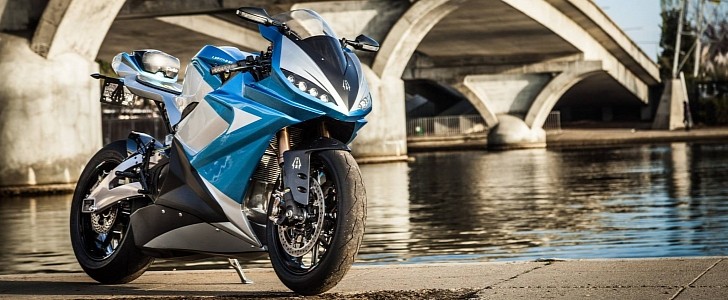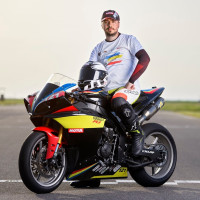Over the past 100 years, companies from all around the world have been experimenting with various type of motorcycles and scooters alike. Different shapes, sizes, types of engines, ever focused on providing their customers with a satisfying experience at the end of the day.
Internal Combustion Engines (ICE) have dominated the scene, just as they have done with cars , but there's no denying the interest people have shown for electric powered motorcycles as well.
Experiments toward developing an electric motorcycle can be traced as far back as the late 19th century - albeit the patent at the time was making reference to an electrical bicycle, but the interest for this sector has steadily risen over the past decade, on the backdrop of ever increasing emission regulations and concern for global climate change.
Nowadays there is quite a wide selection of electrical motorcycles and scooters from which you can choose, and for some of these, riders may reach a point where they could forget all about their old gasoline powered, high-revving machines.
While large companies like Yamaha and Kawasaki are working toward launching a few battery fueled motorcycles in the near future, other less known companies have already made good improvements towards developing a solid, effective application for two-wheels enthusiasts.
Take, for instance, Energica, a European company that prides itself in being the first Italian manufacturer of supersport electric motorcycles. Its Ego model, pushing out figures of 145 hp and 215 Nm of torque, all while capable of doing a top speed of 240 kph (149 mph), has already become the base for the MotoE World Series, and in its Ego+ version is theoretically capable of doing 400 km (249 miles) on a single charge.
Further to the West, American company Lightning has gone even further with their LS-218 motorcycle, which is capable of going well over 300 kph (186 mph), with 200 hp available to the rear wheel. So it doesn't look like switching to electric will take none of the fun away from riding a motorcycle.
Even Harley-Davidson has joined in on the action, with their Livewire model, which starts at around $30.000, slightly cheaper than the LS218, but definitely not as fast. Husqvarna will also be joining in on the action starting 2021 or 2022.
As with everything else in life, these electric motorcycles come with both pros and cons, which you would definitely need to consider before buying one. While the lower running costs and instant torque might be a major turn on, you need to make peace with the idea that, at least for now, these bikes tend to be considerably heavier than their ICE counterparts, and there's also the lower range figures you need to consider.
Last but not least, you should probably decide if you like the fact that this kind motorcycle is going to be a lot quieter than anything else on two wheels, which can be a good thing if you like going out for a ride in the middle of the night and you aren't keen on waking everyone up, but can be a downside if you fancy the smell of burnt gasoline and the sound of a 10K+ RPM engine.
All in all, should you go searching the internet for people reacting to electric powered motorcycles, most riders tend to be overwhelmed by the instant throttle response, and the way these bikes can handle day to day situations. Sure, the noise isn't there anymore, but as range figures increase and weight figures decrease, electric motorcycles might just be stealing the spotlight in a few years time!
Experiments toward developing an electric motorcycle can be traced as far back as the late 19th century - albeit the patent at the time was making reference to an electrical bicycle, but the interest for this sector has steadily risen over the past decade, on the backdrop of ever increasing emission regulations and concern for global climate change.
Nowadays there is quite a wide selection of electrical motorcycles and scooters from which you can choose, and for some of these, riders may reach a point where they could forget all about their old gasoline powered, high-revving machines.
While large companies like Yamaha and Kawasaki are working toward launching a few battery fueled motorcycles in the near future, other less known companies have already made good improvements towards developing a solid, effective application for two-wheels enthusiasts.
Take, for instance, Energica, a European company that prides itself in being the first Italian manufacturer of supersport electric motorcycles. Its Ego model, pushing out figures of 145 hp and 215 Nm of torque, all while capable of doing a top speed of 240 kph (149 mph), has already become the base for the MotoE World Series, and in its Ego+ version is theoretically capable of doing 400 km (249 miles) on a single charge.
Further to the West, American company Lightning has gone even further with their LS-218 motorcycle, which is capable of going well over 300 kph (186 mph), with 200 hp available to the rear wheel. So it doesn't look like switching to electric will take none of the fun away from riding a motorcycle.
Even Harley-Davidson has joined in on the action, with their Livewire model, which starts at around $30.000, slightly cheaper than the LS218, but definitely not as fast. Husqvarna will also be joining in on the action starting 2021 or 2022.
As with everything else in life, these electric motorcycles come with both pros and cons, which you would definitely need to consider before buying one. While the lower running costs and instant torque might be a major turn on, you need to make peace with the idea that, at least for now, these bikes tend to be considerably heavier than their ICE counterparts, and there's also the lower range figures you need to consider.
Last but not least, you should probably decide if you like the fact that this kind motorcycle is going to be a lot quieter than anything else on two wheels, which can be a good thing if you like going out for a ride in the middle of the night and you aren't keen on waking everyone up, but can be a downside if you fancy the smell of burnt gasoline and the sound of a 10K+ RPM engine.
All in all, should you go searching the internet for people reacting to electric powered motorcycles, most riders tend to be overwhelmed by the instant throttle response, and the way these bikes can handle day to day situations. Sure, the noise isn't there anymore, but as range figures increase and weight figures decrease, electric motorcycles might just be stealing the spotlight in a few years time!

